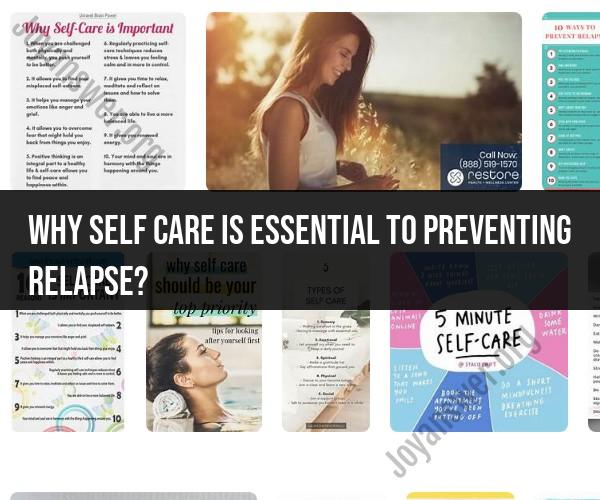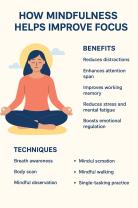Why self care is essential to preventing relapse?
Self-care is essential to preventing relapse in individuals recovering from addiction for several important reasons:
Stress Reduction: Self-care practices, such as relaxation techniques, mindfulness, and exercise, help reduce stress. Stress is a significant trigger for relapse, as individuals may turn to substances or unhealthy behaviors as a way to cope with stressors. Effective stress management through self-care can reduce the risk of relapse.
Emotional Regulation: Addiction often co-occurs with emotional dysregulation. Self-care activities, including therapy, meditation, and journaling, help individuals develop healthier coping mechanisms for managing emotions. By addressing emotional triggers and building emotional resilience, self-care can prevent relapse driven by emotional distress.
Improved Mental Health: Many people with substance use disorders have co-occurring mental health conditions, such as depression or anxiety. Self-care practices can contribute to improved mental health by promoting well-being, reducing symptoms, and enhancing overall mood. A better mental state is less conducive to relapse.
Enhanced Self-Esteem and Self-Worth: Self-care involves nurturing one's physical and emotional needs. Engaging in self-care activities can boost self-esteem and self-worth, which are often compromised during addiction. When individuals feel better about themselves, they are less likely to engage in self-destructive behaviors, including relapse.
Mindfulness and Self-Awareness: Self-care practices often involve mindfulness techniques, which encourage individuals to stay present and aware of their thoughts, feelings, and behaviors. This self-awareness can help individuals recognize early signs of relapse, such as cravings or negative thought patterns, and take proactive steps to address them.
Healthy Coping Mechanisms: Addiction often involves unhealthy coping mechanisms, such as substance use. Self-care promotes the development of healthier coping strategies, such as exercise, creative expression, or spending time with loved ones. These alternatives provide positive outlets for managing stress and difficult emotions, reducing the reliance on substances.
Social Support: Self-care can involve building and nurturing a support network. This includes relationships with friends, family, and support groups. A strong support system can provide encouragement, accountability, and a safety net in times of vulnerability, reducing the risk of relapse.
Physical Well-Being: Good physical health is closely linked to mental and emotional well-being. Engaging in self-care activities like regular exercise, balanced nutrition, and adequate sleep can boost overall health and energy levels, making individuals more resilient to cravings and triggers.
Relapse Prevention Strategies: Many self-care programs include relapse prevention strategies. These strategies teach individuals how to recognize and manage high-risk situations, develop coping skills, and create relapse prevention plans. They provide practical tools for maintaining sobriety.
Long-Term Recovery: Self-care is not just about avoiding relapse; it's about sustaining long-term recovery. By incorporating self-care into daily life, individuals can build a foundation for ongoing wellness, personal growth, and fulfillment, reducing the likelihood of relapse as they continue on their recovery journey.
In addiction recovery, self-care is not a luxury but a necessity. It is a proactive and ongoing effort to prioritize one's physical, emotional, and mental well-being. By engaging in self-care practices and addressing underlying issues, individuals can significantly reduce the risk of relapse and enjoy a healthier and more fulfilling life in recovery.
Preventing Relapse with Self-Care: Why It's a Crucial Component
Relapse is a common part of the recovery process. However, there are steps that people can take to prevent relapse, such as practicing self-care. Self-care is the practice of taking care of one's physical, mental, and emotional well-being. It is important for everyone, but it is especially important for people in recovery.
Self-care can help to prevent relapse in a number of ways. First, it can help to reduce stress. Stress is a common trigger for relapse, so it is important to find ways to manage stress in a healthy way. Self-care activities such as exercise, yoga, and meditation can help to reduce stress levels.
Second, self-care can help to improve mood. Depression and anxiety are other common triggers for relapse. Self-care activities such as spending time in nature, listening to music, and spending time with loved ones can help to improve mood and reduce the risk of relapse.
Third, self-care can help to build resilience. Resilience is the ability to bounce back from setbacks. People in recovery need to be resilient in order to withstand the challenges that they will face on their journey. Self-care activities can help to build resilience by teaching people how to cope with stress, manage their emotions, and maintain a positive attitude.
Relapse Prevention and Self-Care: Building Resilience in Recovery
There are a number of ways that people can use self-care to build resilience in recovery. Some examples include:
- Exercise: Exercise is a great way to reduce stress, improve mood, and boost energy levels. Aim for at least 30 minutes of moderate-intensity exercise most days of the week.
- Meditation: Meditation is a great way to relax the mind and body, and to reduce stress and anxiety. There are many different types of meditation, so find one that works for you and stick with it.
- Spending time in nature: Spending time in nature has been shown to have a number of health benefits, including reducing stress, improving mood, and boosting creativity. Get outside and enjoy the fresh air and sunshine whenever possible.
- Spending time with loved ones: Spending time with loved ones can provide social support and companionship. Social support is an important factor in relapse prevention.
- Getting enough sleep: Sleep is essential for physical and mental health. Aim for 7-8 hours of sleep per night.
Self-Care as a Relapse Barrier: Strategies for Sustained Sobriety
Self-care is a crucial component of relapse prevention. By practicing self-care, people in recovery can reduce stress, improve mood, and build resilience. This can help them to withstand the challenges of recovery and maintain sustained sobriety.
Here are some additional strategies for using self-care as a relapse barrier:
- Identify your triggers: What are the things that make you want to use? Once you know your triggers, you can develop strategies for avoiding them or coping with them in a healthy way.
- Create a relapse prevention plan: Your relapse prevention plan should include a list of your triggers, coping strategies, and contact information for support people.
- Talk to your therapist: Your therapist can help you to develop a self-care plan and relapse prevention plan that is tailored to your individual needs.
- Join a support group: Support groups can provide social support and accountability. They can also be a great place to learn new coping skills and strategies for self-care.
If you are struggling with self-care, please reach out to your therapist or another support person. They can help you to develop a self-care plan that is right for you.













